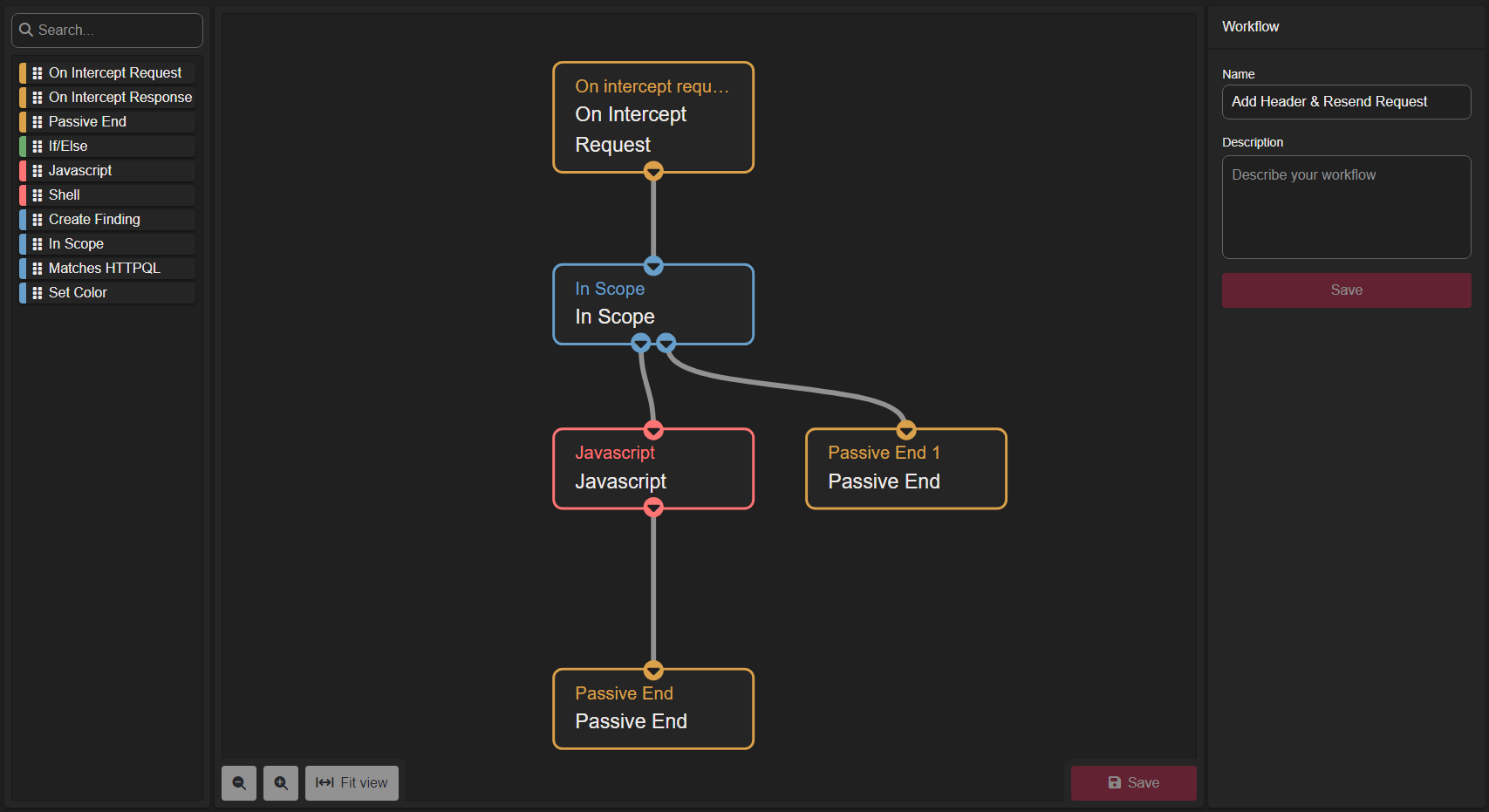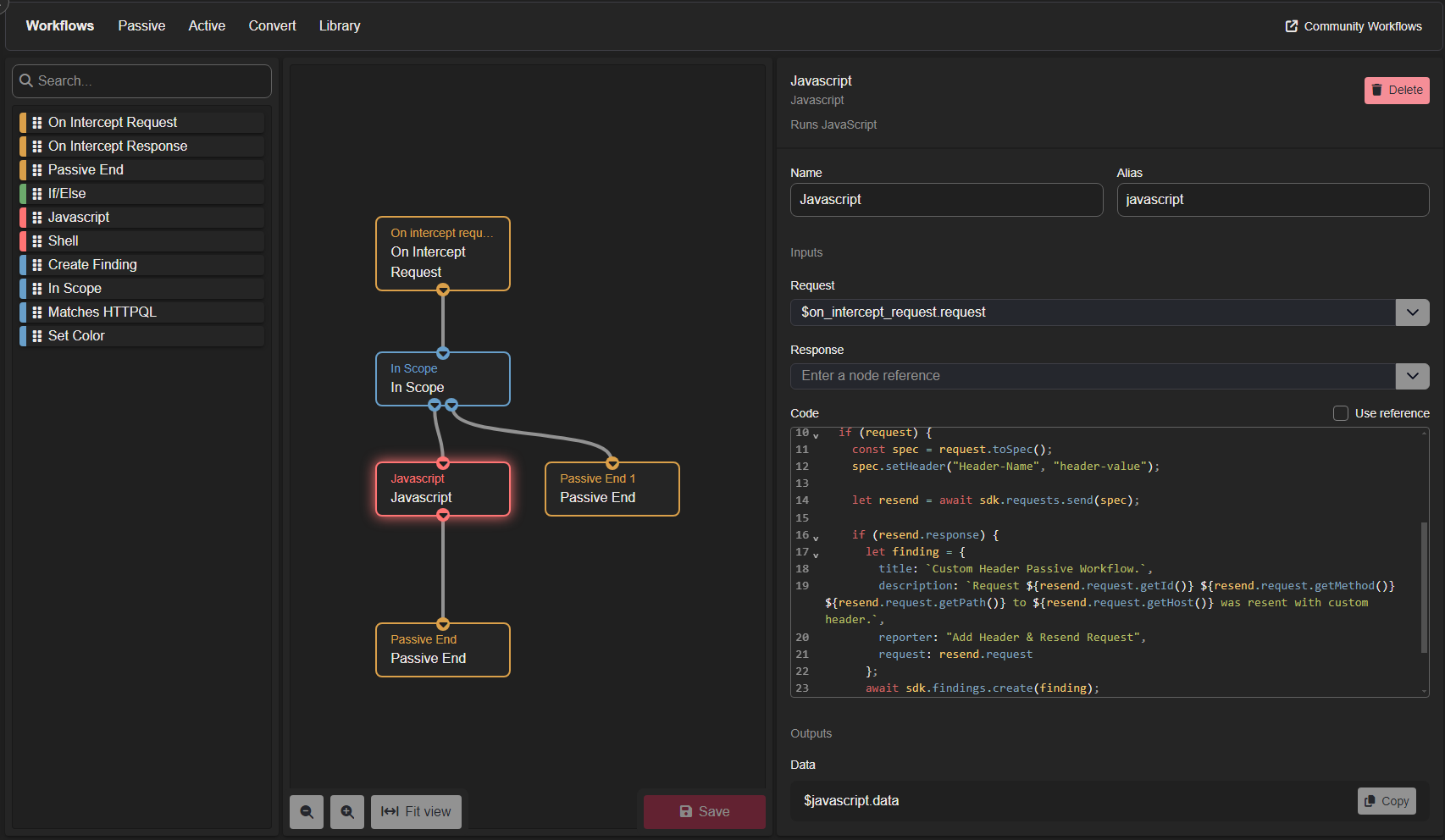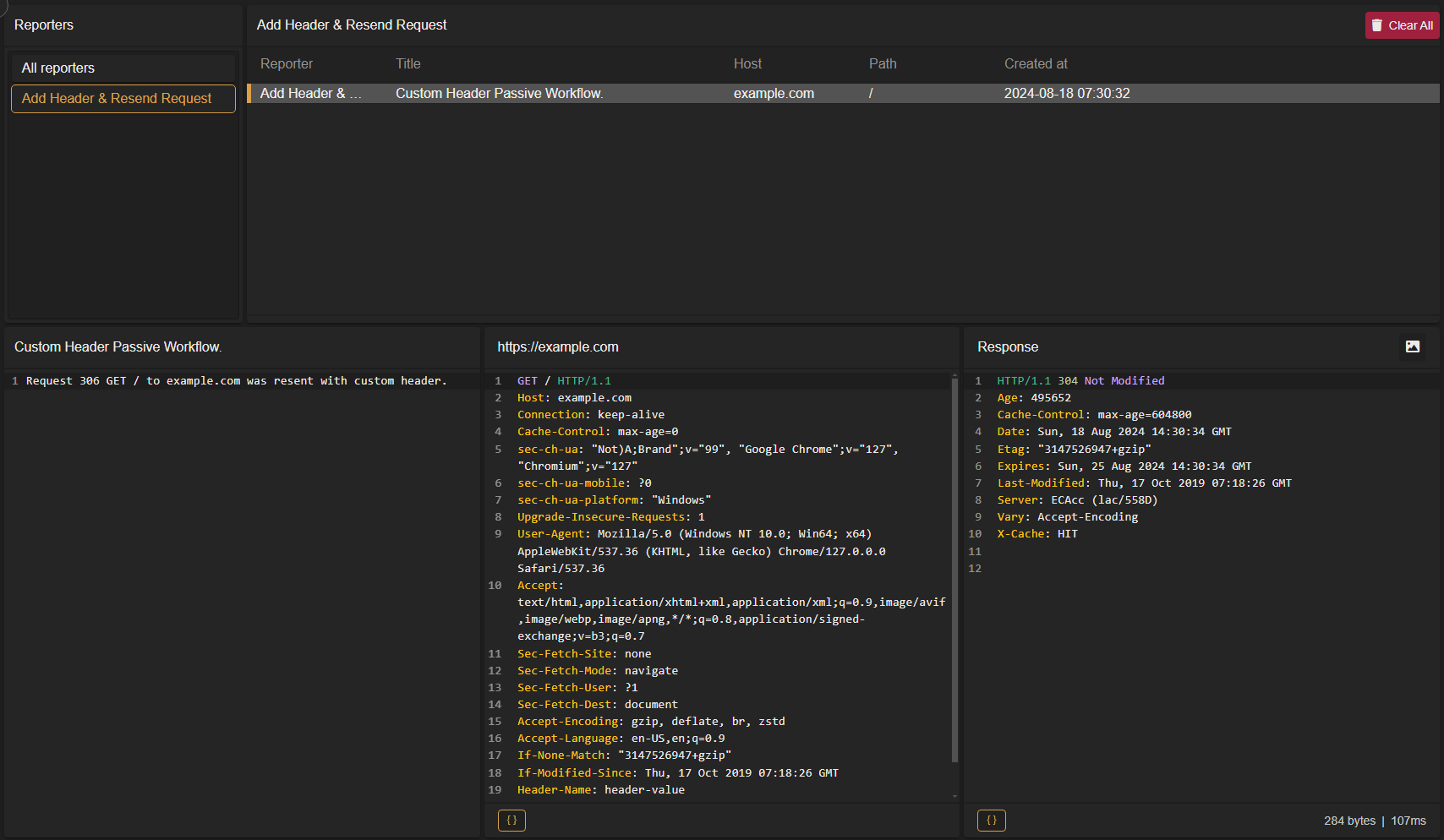Add Header & Send Request Workflow
This guide will assist you in building a Passive Workflow that will add a header to an in-scope request and resend the request with it.
Nodes and Connections
For this Workflow, the overall Node layout will be:

- The
On intercept requestwill output$on_intercept_request.requestwhich represents the request that passed through the Caido proxy. - The request will be sent to the
In ScopeNode. This will check if the request is within your current scope. - If the request is within scope it will be passed to the
JavaScriptNode. If it is not - the Workflow will end. - Once the request has been processed by the script in the
JavaScript Node, the Workflow will come to an end.
Typing
When a JavaScript Node is executed inside a Workflow, the run function will be triggered.
The JSDoc comments note the types of the parameters and return value.
1.
/**
* @param {HttpInput} input
* @param {SDK} sdk
* @returns {MaybePromise<Data | undefined>}
*/- This function will take the
inputandsdkparameters. TheSDKobject is an interface to the Caido backend. - The
inputobject is aHttpInputobject, which represents a request and its associated reponse. - The type alias of
{MaybePromise<Data | undefined>}handles both synchronous and asynchronous values. It will either return a byte value or returnundefined.
Creating the JavaScript Node

The function is exported so it can be executed by QuickJS, the JavaScript engine used by Caido.
2.
export async function run({ request, response }, sdk) {
let reqID = request.getId();
sdk.console.log(`Request ${reqID} is in-scope and will be sent with your header addition.`);- The function is asynchronous since it needs to await the request and response objects.
- You can print to the Caido backend log file by using the
consoleinterface provided by the SDK.
INFO
Within the logs, the message will resemble:
2024-08-18T14:30:31.896354Z INFO executor:0|arbiter:0 js|sdk: Request 305 is in-scope and will be sent with your header addition.
The script will execute everytime an in-scope request passes through the proxy.
3.
if (request) {
const spec = request.toSpec();
spec.setHeader("Header-Name", "header-value");The request will be converted from its immutable state into a mutable one using the
.toSpec()method.Now that we are able to edit the request object, we can add an arbitrary header using the
.setHeader()method.
We must wait for the request to be sent and response to be returned before using them.
4.
let resend = await sdk.requests.send(spec);
if (resend.response) {
sdk.console.log("Response to Add Header & Resend Request Workflow received.")
let finding = {
title: `Custom Header Passive Workflow.`,
description: `Request ${resend.request.getId()} ${resend.request.getMethod()} ${resend.request.getPath()} to ${resend.request.getHost()} was resent with custom header.`,
reporter: "Add Header & Resend Request",
request: resend.request
};
await sdk.findings.create(finding);
}
}
}- To stall the function from executing until the promise that represents the request and response objects is returned - the
awaitkeyword is used. - Once the response is received (the exchange is complete) a Finding is created. Supply anything you want to the
title,descriptionandreporterproperties of thefindingobject. - The
requestproperty will include the request sent that includes our custom header. - Finally, the creation of the Finding is awaited to give it time to be processed on the backend.
Conclusion
The generated finding should resemble:

The full JavaScript Node script is provided below:
Full Script
/**
* @param {HttpInput} input
* @param {SDK} sdk
* @returns {MaybePromise<Data | undefined>}
*/
export async function run({ request, response }, sdk) {
let reqID = request.getId();
sdk.console.log(`Request ${reqID} is in-scope and will be sent with your header addition.`);
if (request) {
const spec = request.toSpec();
spec.setHeader("Header-Name", "header-value");
let resend = await sdk.requests.send(spec);
if (resend.response) {
let finding = {
title: `Custom Header Passive Workflow.`,
description: `Request ${resend.request.getId()} ${resend.request.getMethod()} ${resend.request.getPath()} to ${resend.request.getHost()} was resent with custom header.`,
reporter: "Add Header & Resend Request",
request: resend.request
};
await sdk.findings.create(finding);
}
}
}The full Workflow is provided below, ready to be imported.
Full Workflow
{
"description": "",
"edition": 2,
"graph": {
"edges": [
{
"source": {
"exec_alias": "exec",
"node_id": 2
},
"target": {
"exec_alias": "exec",
"node_id": 1
}
},
{
"source": {
"exec_alias": "exec",
"node_id": 0
},
"target": {
"exec_alias": "exec",
"node_id": 3
}
},
{
"source": {
"exec_alias": "false",
"node_id": 3
},
"target": {
"exec_alias": "exec",
"node_id": 4
}
},
{
"source": {
"exec_alias": "true",
"node_id": 3
},
"target": {
"exec_alias": "exec",
"node_id": 2
}
}
],
"nodes": [
{
"alias": "on_intercept_request",
"definition_id": "caido/on-intercept-request",
"display": {
"x": 0,
"y": -180
},
"id": 0,
"inputs": [],
"name": "On intercept request",
"version": "0.1.0"
},
{
"alias": "passive_end",
"definition_id": "caido/passive-end",
"display": {
"x": 0,
"y": 300
},
"id": 1,
"inputs": [],
"name": "Passive End",
"version": "0.1.0"
},
{
"alias": "javascript",
"definition_id": "caido/http-code-js",
"display": {
"x": 0,
"y": 110
},
"id": 2,
"inputs": [
{
"alias": "request",
"value": {
"data": "$on_intercept_request.request",
"kind": "ref"
}
},
{
"alias": "code",
"value": {
"data": "/**\n * @param {HttpInput} input\n * @param {SDK} sdk\n * @returns {MaybePromise<Data | undefined>}\n */\nexport async function run({ request, response }, sdk) {\n let reqID = request.getId();\n sdk.console.log(`Request ${reqID} is in-scope and will be sent with your header addition.`);\n\n if (request) { \n const spec = request.toSpec();\n spec.setHeader(\"Header-Name\", \"header-value\");\n\n let resend = await sdk.requests.send(spec);\n \n if (resend.response) {\n let finding = {\n title: `Custom Header Passive Workflow.`,\n description: `Request ${resend.request.getId()} ${resend.request.getMethod()} ${resend.request.getPath()} to ${resend.request.getHost()} was resent with custom header.`,\n reporter: \"Add Header & Resend Request\",\n request: resend.request\n };\n await sdk.findings.create(finding);\n }\n }\n}\n",
"kind": "string"
}
}
],
"name": "Javascript",
"version": "0.1.0"
},
{
"alias": "in_scope",
"definition_id": "caido/in-scope",
"display": {
"x": 0,
"y": -20
},
"id": 3,
"inputs": [
{
"alias": "request",
"value": {
"data": "$on_intercept_request.request",
"kind": "ref"
}
}
],
"name": "In Scope",
"version": "0.1.0"
},
{
"alias": "passive_end_1",
"definition_id": "caido/passive-end",
"display": {
"x": 200,
"y": 110
},
"id": 4,
"inputs": [],
"name": "Passive End 1",
"version": "0.1.0"
}
]
},
"id": "73b8b470-8892-4e9c-ab9b-cdc3d13f3f57",
"kind": "passive",
"name": "Add Header & Resend Request"
}